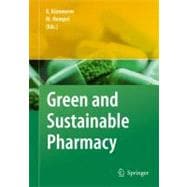
| General Aspects | |
| Why Green and Sustainable Pharmacy? | p. 3 |
| Pharmaceuticals in the Environment: Moving from a Problem to a Solution | p. 11 |
| Pharmaceuticals in Society | p. 23 |
| Green(er) Pharmacy | p. 37 |
| Creating a Sustainability Culture - A (Human Resources) Management Perspective for Sustainable Pharmacy | p. 61 |
| Reducing the Ecological Footprint of Pharmaceutical Usage: Linkages Between Healthcare Practices and the Environment | p. 77 |
| Development, Synthesis and Production and Distribution of Pharmaceuticals | |
| Ecopharmacostewardship - A Pharmaceutical Industry Perspective | p. 105 |
| Protein and Peptide Therapeuticals: An Example of "Benign by Nature" Active Pharmaceutical Ingredients | p. 127 |
| Rational Design of Molecules by Life Cycle Engineering | p. 135 |
| Use and Disposal of Pharmaceuticals | |
| Options for a More Environmentally Friendly Handling of Pharmaceuticals | p. 149 |
| Disposal of Pharmaceutical Waste in Households - A European Survey | p. 165 |
| Pharmaceutical Waste: The Patient Role | p. 179 |
| Forecast of Pharmaceutical Consumption in the Netherlands Using Demographic Projections | p. 201 |
| Emission Management | |
| Point Sources of Human Pharmaceuticals into the Aquatic Environment | p. 211 |
| Pharmaceuticals for Human Use: An Integrated Strategy for Reducing the Contamination of Water Bodies | p. 225 |
| Experiences with the Swedish Environmental Classification Scheme | p. 243 |
| Incentives, Regulation and the Market | |
| European Regulations | p. 253 |
| Regulation and the Market-Incentives | p. 279 |
| Do Pharmaceuticals in the Environment Present an Investment Risk? | p. 287 |
| Outlook | |
| Sustainable Health Products and Service Solutions in the Year 2050 | p. 295 |
| Summary and Outlook | p. 299 |
| Index | p. 305 |
| Table of Contents provided by Ingram. All Rights Reserved. |
The New copy of this book will include any supplemental materials advertised. Please check the title of the book to determine if it should include any access cards, study guides, lab manuals, CDs, etc.
The Used, Rental and eBook copies of this book are not guaranteed to include any supplemental materials. Typically, only the book itself is included. This is true even if the title states it includes any access cards, study guides, lab manuals, CDs, etc.